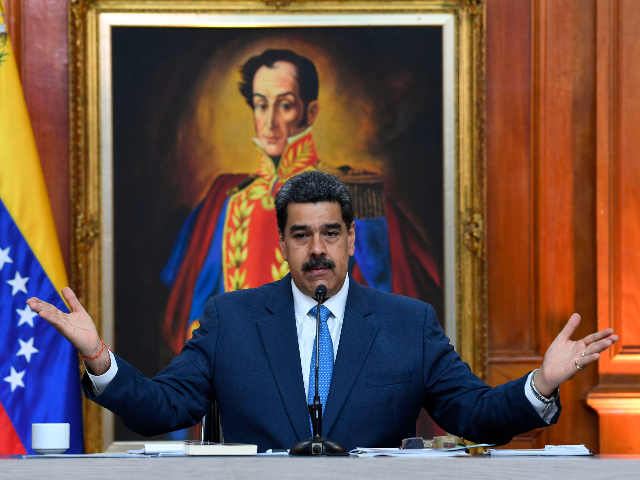Venezuela’s socialist dictatorship lodged a formal protest against the United States on Thursday at the International Criminal Court (ICC), asking The Hague to formally investigate Washington for “crimes against humanity.”
The International Criminal Court is a legal venue that can find both individuals and nations guilty under universal human rights laws and is typically used to prosecute war crimes and crimes against humanity such as genocide, or widespread use of torture, rape, forced abortions, sterilization, and other measures to silence minorities or political dissidents.
The Maduro regime, which is not legally in control of Venezuela, is accusing America of crimes against humanity for enacting economic sanctions.
The administration of President Donald Trump has greatly extended sanctions to cover senior members of the Maduro regime and has imposed sanctions on Venezuela’s state-run oil industry and other sources of revenue. The sanctions are a response to egregious human rights crimes committed by the Maduro regime, including the imprisonment, torture, and killing of political dissidents. Venezuela is also living the worst humanitarian crisis in its history, sending millions into exile and forcing those in the country to scavenge for food in trash, as a result of Maduro’s socialist price controls and other economic policies.
Maduro is not the president of Venezuela as of January 2019, when his term ended. He retains control of the Venezuelan military, however, which mounting evidence indicates functions as a personal drug cartel for the United Socialist Party of Venezuela (PSUV). The current president of Venezuela is Juan Guaidó, constitutionally appointed after Maduro’s term ended.
Maduro’s “foreign minister,” Jorge Arreaza, traveled to The Hague this week to demand a formal inquiry into alleged “crimes against humanity” by the United States. Arreaza, son-in-law to late dictator Hugo Chávez, described economic sanctions as “weapons of mass destruction” and compared U.S. policy against Maduro to the Holocaust.
“They are weapons of mass destruction and only with multilateralism, fully activated and on the offensive against illegality, can we stop them,” he told the ICC. “Not only will the Bolivarian Republic of Venezuela do it with its capacity for resilience, but the multilateral system, coordinated states should detain the barbarity. The only empire that should exist is the empire of law.”
The sanctions, Arreaza reportedly said, “are like the persecution of the Jewish people during the Holocaust or the persecution of the Palestinian people.”
Venezuela’s foreign ministry described the term “sanctions” for economic bans on human rights violators using American infrastructure to profit or sell goods in America as a “euphemism.” Maduro’s regime called the denunciation at the ICC a “historic moment” that needs to be addressed “urgently.”
Entregamos a la Fiscal de la Corte Penal Internacional una rigurosa remisión y denuncia por crímenes de Lesa Humanidad contra funcionarios de EEUU, por las Medidas Coercitivas Unilaterales: se trata de un ataque generalizado, masivo y sistemático contra el pueblo de Venezuela. pic.twitter.com/MrTsm5AlP5
— Jorge Arreaza M (@jaarreaza) February 13, 2020
The Trump administration has systematically imposed sanctions on Maduro’s Caracas elite, which continue to live in luxury while the majority of the nation struggles to eat. A poll released this week by the Venezuelan firm Meganálisis found that 78.5 percent of Venezuelans have either “irregular” or “poor” access to electricity; of those who had consistent, reliable electricity, only 0.2 percent resided outside of Caracas and its neighboring wealthy states. Another 82.7 percent of people said they did not have reliable access to water.
To keep money out of the hands of the Maduro regime, noting its illegitimacy as a real government, the Trump administration has sanctioned its top sources of revenue. On the top of that list is Petróleos de Venezuela (PDVSA), the state-run oil company, which Washington sanctioned last year. Other sanctions have targeted individuals known to engage in or support the use of torture and extrajudicial killing of political dissidents – banning them from the United States and cutting their access to American banks and businesses – and freezing the U.S.-based assets of the Maduro regime itself.
The United States has also sanctioned members of Nicolás Maduro’s family for using emergency food funds to profit personally, keeping much-needed humanitarian aid out of the hands of Venezuelans. Maduro has so succeeded in keeping food out of the hands of Venezuelans, and the Meganálisis poll found that over 80 percent of those asked were not aware of any international programs offering food aid to the country.
This week, the Trump administration sanctioned Conviasa, the Maduro regime’s state airline.
While Arreaza demands an investigation into the United States, the Maduro regime is facing its own accusation of crimes against humanity. Six Western Hemisphere states – Argentina, Canada, Chile, Colombia, Paraguay, and Peru – sued the regime at the ICC in 2018 for crimes against humanity. Among the accusations are claims of the use of military force to kill and injure dissidents, the use of torture in political prisons, and the denial of food aid and other necessities to those who do not vocally support Maduro.
The Maduro regime has consistently blamed the United States – first the administration of Barack Obama, now that of President Trump – for the death, violence, and starvation plaguing the country.

COMMENTS
Please let us know if you're having issues with commenting.